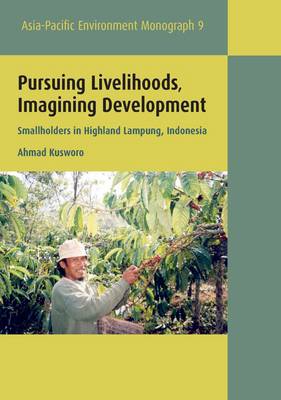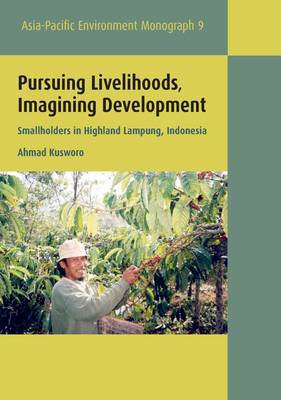
Door een staking bij bpost kan je online bestelling op dit moment iets langer onderweg zijn dan voorzien. Dringend iets nodig? Onze winkels ontvangen jou met open armen!
- Afhalen na 1 uur in een winkel met voorraad
- Gratis thuislevering in België vanaf € 30
- Ruim aanbod met 7 miljoen producten
Door een staking bij bpost kan je online bestelling op dit moment iets langer onderweg zijn dan voorzien. Dringend iets nodig? Onze winkels ontvangen jou met open armen!
- Afhalen na 1 uur in een winkel met voorraad
- Gratis thuislevering in België vanaf € 30
- Ruim aanbod met 7 miljoen producten
Zoeken
Pursuing Livelihoods, Imagining Development
Smallholders in Highland Lampung, Indonesia
Ahmad Kusworo
€ 53,45
+ 106 punten
Omschrijving
This monograph explores the ways in which people experience 'development' and how development shapes and maintains their lives. The discussion begins with Lampung Province, moves to one of the province's highland regions, and ends in a village in this highland region. Colonial and post-colonial initiatives drove the transformation of Lampung in the twentieth century bringing mixed results and effects including rapid growth in agricultural production, the formation of 'wealthy zones' in some areas, and the creation of pockets of poverty in other areas. In Sumber Jaya and the highlands of Way Tenong, migrants have transformed one of Lampung's last frontier regions into one of its 'wealthy zones'. Although the bulk of these migrants migrated spontaneously, they were integrated within the framework of planned development. The level of progress that the region has achieved is largely the result of villagers' efforts to bring state resources to the village. In conflict with forestry authorities for decades, farmers in some villages have agreed to establish a new relationship with authorities, but the struggle for control over land resources continues.
Specificaties
Betrokkenen
- Auteur(s):
- Uitgeverij:
Inhoud
- Aantal bladzijden:
- 202
- Taal:
- Engels
- Reeks:
- Reeksnummer:
- nr. 9
Eigenschappen
- Productcode (EAN):
- 9781925021479
- Verschijningsdatum:
- 1/01/2014
- Uitvoering:
- Paperback
- Formaat:
- Trade paperback (VS)
- Afmetingen:
- 176 mm x 250 mm
- Gewicht:
- 467 g

Alleen bij Standaard Boekhandel
+ 106 punten op je klantenkaart van Standaard Boekhandel
Beoordelingen
We publiceren alleen reviews die voldoen aan de voorwaarden voor reviews. Bekijk onze voorwaarden voor reviews.











